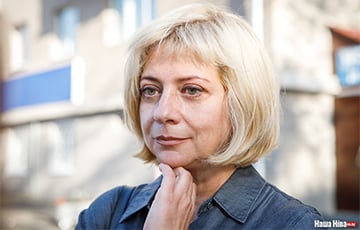Political Prisoner Arithmetic
8- 5.04.2024, 10:45
- 18,210

PHOTO: NASHA NIVA
There are millions of us.
Today we all worry about Iryna Takarchuk, the mother of former political prisoner Volha Takarchuk. Iryna was imprisoned in the "food case" during the mass arrests on January 23. After that, Volha was forced to flee from Belarus together with her father and children. Except that they live in different countries - Volha's dad and grandchildren are in Georgia, while she herself is in Lithuania.
Recently I was talking to Volha, asking about her mum. Then we started talking about thousands of Belarusian political prisoners, and then Volha suddenly started to count up, mathematically and accurately, how many human lives are broken when just one person is behind bars.
Volha used her own family as an example. Look, she said, my mum is in prison, and what happened to all of us? And she started to describe how her father, who had achieved a lot in his life, had to flee to a foreign country at the age of 64, because he could have been imprisoned as well. He took his grandchildren out, and is waiting for a Lithuanian visa in Georgia. It is an unbearable ordeal at the age of 64 to leave behind the door of your beloved cosy flat all your former life and to close this door. The grandchildren - Volha's children - were torn out of their usual world (school, friends, parents, grandparents) in one day and have not seen their parents for two months. Volha's mother-in-law is crying day and night because she doesn't know when she will see her grandchildren next time - Lithuania is now very reluctant to issue visas. Volha's husband, with whom she is getting a divorce but still has a good relationship, also does not know when he will see his children. Volha's sister is now carrying care packages to the pre-trial detention centre and looking after their invalid grandmother, who used to be looked after by her father, and she realises that she has remained, in essence, a splinter of a large family in her hometown. There, Takarchuk summarised, now you see: one person has gone to jail - seven people's lives have been ruined. Now multiply the number of political prisoners by seven. Well, let it be by five, not all families are big, there are smaller ones. And you will see the scale of the catastrophe.
So I started counting. Or rather, remembering. I remembered the children of Antanina Kanavalava and Siarhei Yarashevich, taken out of Belarus by their grandmother in 2020 after the arrest of both parents. I remembered the father of Mikalai Statkevich, who realised in the last days of his life that he would never see his son again. I remembered Illiusha Zalatykh, with whom my son Danka used to ride the merry-go-round in the Gorky Park many years ago: at that time Danka's dad was in prison, and nobody knew that ten years later Illia's dad would be in prison, and Illia himself would be taken away from the country in the middle of the school year. I remembered Artsiom Lazarchuk, who was a first-grader in the autumn of 2020, and Minsk residents unanimously fought him off the guardianship authorities and rejoiced at the victory, and now his mother is in jail, his father is dead, and his older sister is working from morning till night and carrying care packages, which are not accepted in the Homel colony without explanation. I remembered many more. You don't even need to remember them: you can point at any name of a political prisoner at random and his arrest will be followed by shattered lives, ruined fates, sleeplessness, depression, and separation.
And if we add to these impressive figures those who are not in jail, but had to flee with one rucksack? These are also families torn apart, lives left in ruins, tears in messengers, longing for a cup of coffee left on the balcony in the morning before fleeing, fear of tomorrow, the psychological traumas of children to whom nothing was explained - they were simply taken by the hand and dragged into the unknown. Can we count how many of them there are? I assure you, if we add up the numbers - families of political prisoners and families of exiles - it's not thousands, not tens of thousands, not even hundreds of thousands. It's millions.
And now it doesn't matter at all how many per cent Sasha has - three, two or zero point two. The story of three per cent is in the past and irrelevant. The only thing that matters is us and the claims we will eventually present. The claims will be, to put it frankly, multi-billion-dollar ones. Surely, we are not that petty and will not demand compensation for moral damage - firstly, mankind has not invented such figures yet, and secondly, there is nothing to take from them, from those miserable people, except Rolexes and Maybachs. Yet it is normal to think about revenge, to dream about retaliation, to draw mental pictures of future retribution with all the power of imagination. Hate is not destructive at all when it's for a cause. Hate is very constructive. Especially when millions do hate.
Iryna Khalip, specially for Charter97.org










